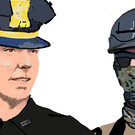From the Editor: A newspaper is not on one side or another
On Aug. 26, 2015, I got a late-night call at the newspaper. It was a Wednesday, the day each week when we stay up all night to put the paper to bed.
The call was from my father. “Your mother’s had a stroke,” he said.
I told him I’d be right there. He told me it would do no good. My parents lived a three-hour drive away, in the Adirondacks. He told me the stroke was massive and that my sister was with him.
“Stay and put the paper out,” he said.
I did.
My father was a journalist to the core. I had learned not just the tools of the trade from him, but the values as well. He and my mother had owned a weekly in Lake Placid; he knew what production night was.
That Wednesday night into the wee hours of Thursday, through tears, I completed my part of layout, mindful of my father’s words: Put the paper out. Then I drove till dawn. I was, of course, too late. My mother was dead.
In the years that followed, as my sisters and I cared for my father who was missing half of himself, much of our talk centered on journalism. As my father had gone blind, I read him out loud a book about Mary McGrory who had covered politics in the same era he had.
He liked it because he remembered the people and events she covered, which he had covered too. I liked it because she was a trailblazing woman. I’d read a page or two, and then our talk about it could go on for an hour.
Every weekend at my father’s house, I would research and write my Enterprise editorial for the week and read it to him out loud. He always had something insightful to say. Sometimes, when he reminisced about stories he’d covered with other journalists, I’d get out my laptop and look up their obituaries. My father was in his 90s; his old reporter friends were all dead.
When my father died on Jan. 4, 2018 — a Thursday, after the paper was out — I lost a touchstone, the person I could always count on to understand a journalistic dilemma. We didn’t always agree on the solution but the talk, the back and forth, would lead to clarity.
The money that was left to me — and the same share to my sisters — sat untouched, to be passed along to my daughters when my husband and I had died.
Then, this past February, our newspaper was served with a subpoena. Lawyers from the Voorheesville school district, embroiled in a lawsuit, wanted our reporter’s notes and recording of a particular school board meeting the district itself hadn’t recorded.
I felt immediately I wanted to post the recording, sharing it as news. My two partners wanted to fight the subpoena.
[Also, "From the publishers: We’re posting a recording of a public meeting"]
As the three of us agonized over the best course of action, my daughter, Magdalena, a lawyer, advised us to hire a First Amendment specialist and noted that, if we didn’t see a court battle through and lost at the trial level, we could set a bad precedent for newspapers across the state.
My daughter, Saranac, a journalist, suggested I could spend the money I’d inherited from my father to fight the case through all three levels of the state’s court system if needed. I was touched beyond words that my children cared more about principles than their own welfare.
I heard my father’s voice telling me, “It’s not enough to bet your bottom dollar; you’ve got to bet your life.”
My partners and I paid to retain a lawyer specializing in First Amendment rights. We read New York’s shield law, drafted to protect journalists from having to disclose confidential information or sources.
The law makes the same distinction I had made in our original column; the law differentiates between information that is confidential and information that is not.
The school district’s lawyers would have to show a judge that the meeting recording was material and relevant, essential to the school’s case, and there was no other way to get it. That’s it.
We attempted to negotiate with the school district’s lawyers, and we read through the relevant case law and discovered there wasn’t a lot of new ground to be broken.
At this point, I was still charged up for a fight while my two more level-headed partners had decided the best course was the original one — to post the recording as news on our website so we could put our resources into the business of gathering and publishing news, often news that isn’t covered elsewhere.
By publishing the recording, we are giving up our legal privilege under the shield law for the recording alone, and to resolve the subpoena we are submitting a business record affidavit authenticating it. In this shifting world of modern journalism, where much production of “news” is at best repackaging of others’ work and at worst outright untruths, we’ve decided to give our all to our central mission — seeking the truth to inform the public.
So, you can read on the facing page our original column, written in February, as today we publish the sought-after recording for all to hear.
We are reminded of a line from T. S. Eliot’s “Little Gidding”: “We shall not cease from exploration, and the end of all our exploring will be to arrive where we started and know the place for the first time.”
I think my father would have liked that.
— Melissa Hale-Spencer



